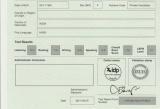Duration:
4 Weeks (Daily 1-hour sessions)
Weekend Mock Tests
Week 1: Focus on Verbal Reasoning
-
Day 1: Introduction to GRE Verbal Reasoning
- Overview of the Verbal Reasoning section structure
- Types of questions: Text Completion, Sentence Equivalence, Reading Comprehension
- Strategies for tackling each question type
-
Day 2: Text Completion - Single and Multiple Blanks
- Techniques for identifying context clues and eliminating wrong choices
- Practice with single-blank and multi-blank text completion questions
- Focus on vocabulary building and understanding sentence structure
-
Day 3: Sentence Equivalence
- Strategies for selecting two correct answers that create similar meanings
- Practice with sentence equivalence questions
- Focus on understanding synonyms and sentence logic
-
Day 4: Reading Comprehension - Short and Long Passages
- Techniques for active reading, summarizing, and identifying main ideas
- Practice with short and long passage reading comprehension questions
- Focus on time management and answering inference, detail, and main idea questions
-
Day 5: Reading Comprehension - Critical Reasoning
- Strategies for analyzing arguments and identifying assumptions, strengths, and weaknesses
- Practice with critical reasoning questions embedded in reading passages
- Focus on understanding argument structure and logical reasoning
-
Weekend: Mock Verbal Reasoning Test
- Full-length Verbal Reasoning test simulation
- Personalized feedback on accuracy, pacing, and strategies
Week 2: Focus on Analytical Writing Assessment (AWA)
-
Day 1: Introduction to GRE Analytical Writing
- Overview of the AWA section structure
- Understanding the two tasks: Issue Task and Argument Task
- Scoring criteria and expectations
-
Day 2: Issue Task - Understanding the Prompt
- Techniques for analyzing the issue prompt and developing a clear position
- Practice with brainstorming ideas and outlining essays
- Focus on organizing thoughts and writing a strong introduction
-
Day 3: Issue Task - Developing and Supporting Arguments
- Strategies for building strong, logical arguments and using relevant examples
- Practice with writing body paragraphs that support the thesis statement
- Focus on coherence, transitions, and logical flow
-
Day 4: Argument Task - Analyzing the Argument
- Techniques for identifying assumptions, flaws, and evidence in the argument prompt
- Practice with writing critical analyses of provided arguments
- Focus on structuring essays and writing concise conclusions
-
Day 5: Refining and Polishing AWA Essays
- Strategies for revising and editing essays for clarity, grammar, and style
- Practice with timed writing to improve speed and accuracy
- Focus on adhering to the word limit and avoiding common pitfalls
-
Weekend: Mock AWA Test
- Timed AWA test simulation with both Issue and Argument tasks
- Personalized feedback on content, structure, and language use
Week 3: Focus on Quantitative Reasoning
-
Day 1: Introduction to GRE Quantitative Reasoning
- Overview of the Quantitative Reasoning section structure
- Types of questions: Quantitative Comparison, Multiple Choice, Numeric Entry, Data Interpretation
- Strategies for approaching each question type
-
Day 2: Arithmetic and Algebra Review
- Focus on basic arithmetic, number properties, and algebraic expressions
- Practice with solving linear equations, inequalities, and word problems
- Tips for quick calculations and error checking
-
Day 3: Geometry and Data Interpretation
- Review of key geometry concepts: lines, angles, triangles, circles, and coordinate geometry
- Practice with interpreting graphs, charts, and tables
- Techniques for solving data interpretation questions efficiently
-
Day 4: Probability, Statistics, and Data Analysis
- Review of probability, mean, median, mode, and standard deviation
- Practice with statistics problems and data analysis
- Focus on understanding and applying statistical concepts to solve problems
-
Day 5: Advanced Quantitative Topics and Problem-Solving Strategies
- Review of advanced topics: permutations, combinations, and complex word problems
- Techniques for solving difficult quantitative comparison questions
- Focus on time management and avoiding common mistakes
-
Weekend: Mock Quantitative Reasoning Test
- Full-length Quantitative Reasoning test simulation
- Personalized feedback on accuracy, pacing, and strategies
Week 4: Integrated Practice and Review
-
Day 1: Mixed Practice - Verbal and Quantitative Reasoning
- Integrated practice with both Verbal and Quantitative questions
- Focus on transitioning between sections and maintaining focus
- Review of key strategies for both sections
-
Day 2: Integrated Practice - AWA and Verbal Reasoning
- Practice with writing an AWA essay followed by Verbal Reasoning questions
- Focus on managing time across different sections
- Review of essay writing techniques and verbal strategies
-
Day 3: Integrated Practice - Quantitative Reasoning and AWA
- Practice with solving Quantitative Reasoning questions followed by an AWA task
- Focus on maintaining accuracy under time constraints
- Review of key quantitative strategies and essay structure
-
Day 4: Full-Length Practice Test (Verbal, Quant, AWA)
- Simulate a full-length GRE test with all sections
- Practice with maintaining focus and stamina across the entire test
- Focus on time management and transitioning between sections
-
Day 5: Review and Final Strategies
- Review of full-length test performance and key takeaways
- Final tips for test day: time management, section order, and handling difficult questions
- Addressing any last-minute concerns or queries
-
Weekend: Final Full-Length Mock GRE Test
- Full-length GRE test simulation with all sections
- Personalized feedback on overall performance and specific areas for improvement
Final Review & Feedback Session
- Day after Final Mock Test:
- Comprehensive review of the final mock test performance
- Individual feedback on Verbal, Quantitative, and AWA sections
- Last-minute tips for exam day and stress management
This GRE course structure is designed to provide comprehensive preparation across all sections of the test, with a strong emphasis on practice, strategic learning, and personalized feedback to ensure your best performance on test day.









